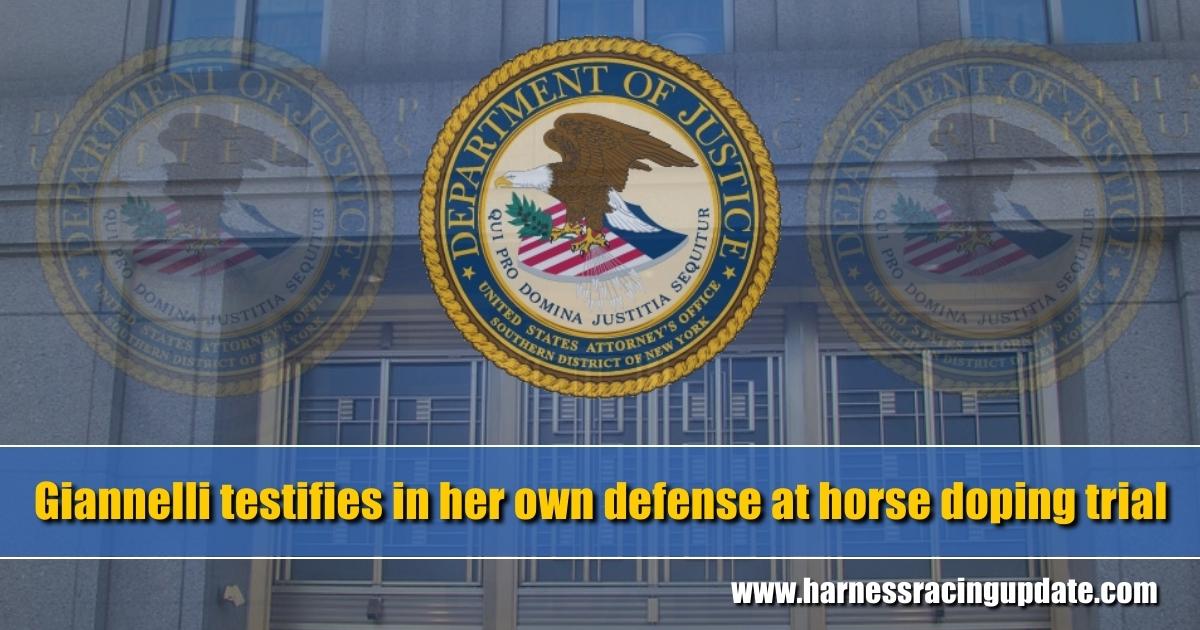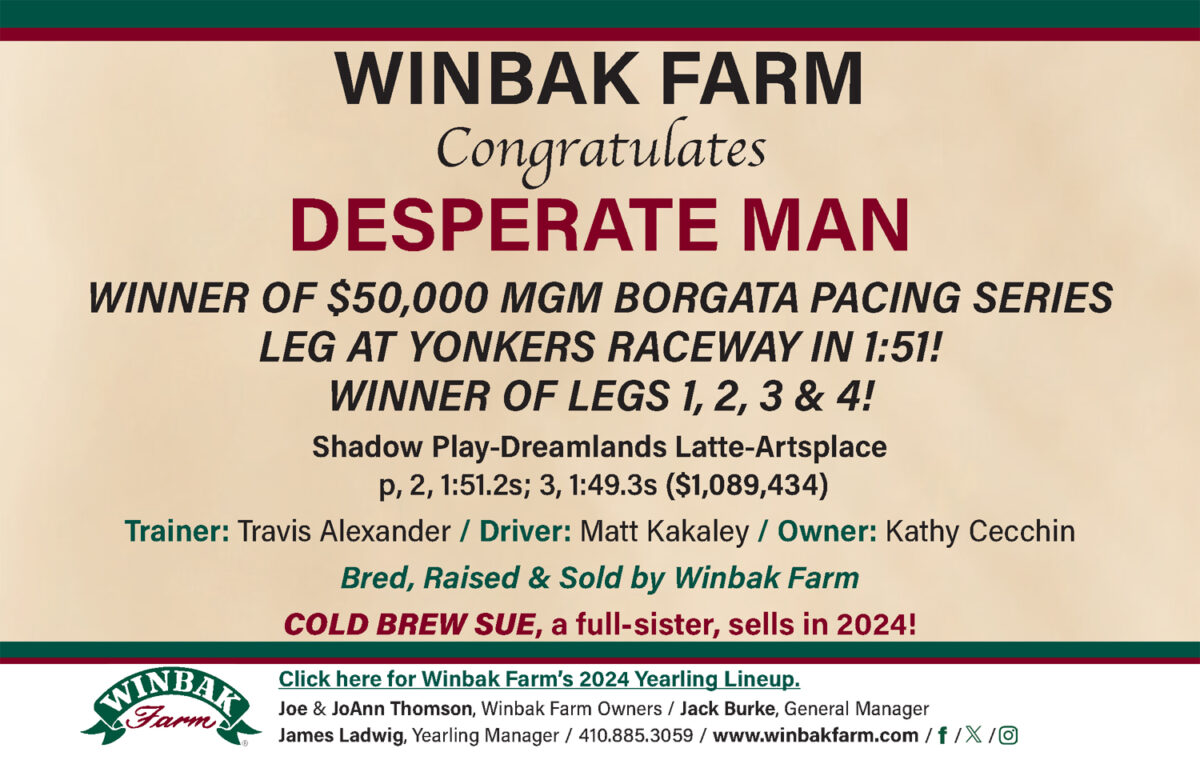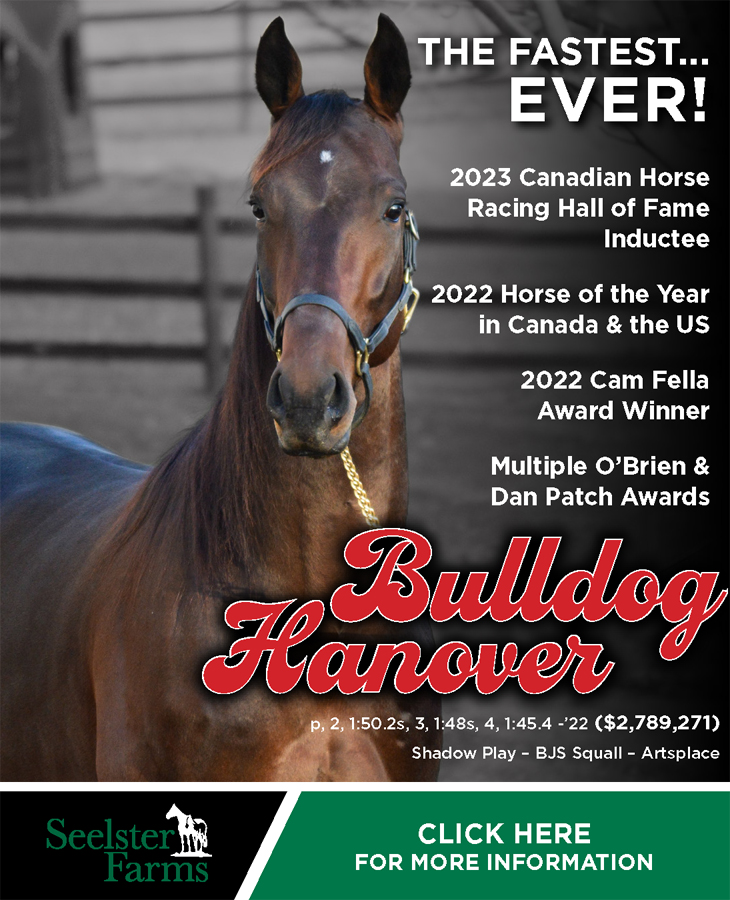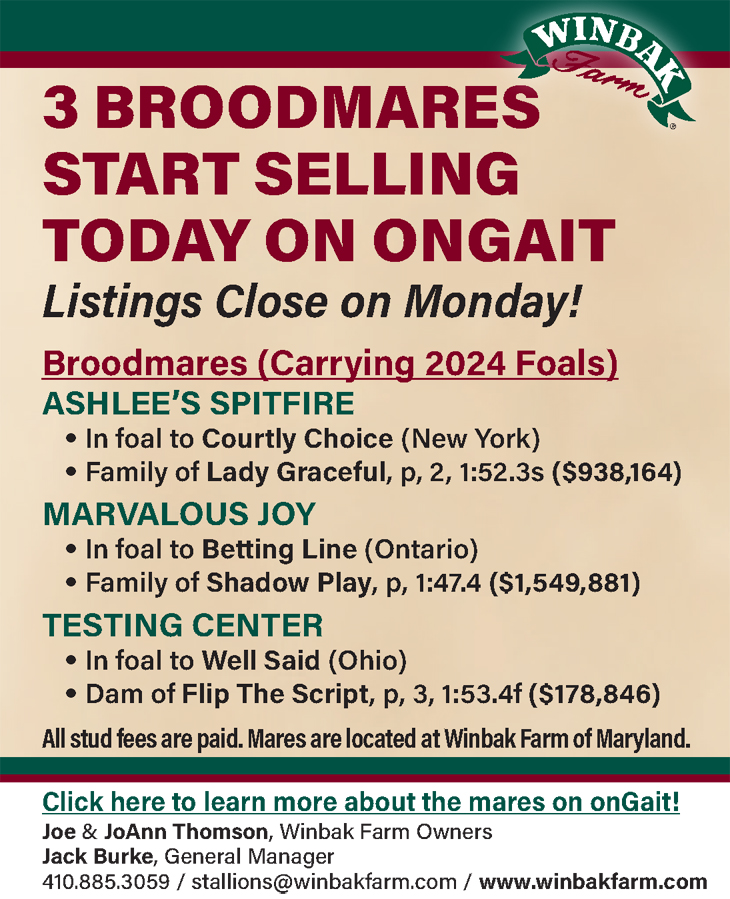

Giannelli testifies in her own defense at horse doping trial
She is on trial on a conspiracy charge, accused of assisting veterinarian Seth Fishman in the distribution of performance-enhancing drugs.
by Robert Gearty
Lisa Giannelli testified at her horse doping trial on Wednesday (May 4) that she had a good reason for wanting to testify in her own defense.
“To tell my story,” she told the jury in U.S. District Court in New York.
She is on trial on a conspiracy charge, accused of assisting veterinarian Seth Fishman in the distribution of performance-enhancing drugs that prosecutors say were used by corrupt trainers to dope racehorses in violation of racing regulations.
During three hours of questioning by her attorney Louis Fasulo, Giannelli, who admitted being nervous when her testimony began, told the jury that it was never her intention to defraud any racing commissions.
She also testified that she never benefited financially when trainers decided to break the rules to win races.
And she testified that she never agreed with Fishman to engage in fraud.
“It was never my intention,” Giannelli testified.
The testimony came on the trial’s sixth day in front of Judge Mary Kay Vyskocil.
The trial resumes Thursday (May 5 – unavailable prior to press time) with closing arguments and then possibly jury deliberations.
Prosecutors say Fishman, who was convicted in February and faces 20 years in prison, manufactured PEDs that Giannelli sold out of her home as an employee of Fishman’s company Equestology.
Giannelli testified it was her understanding she could sell whatever products Fishman created because he was a licensed veterinarian.
“I was just to take orders,” she told the jury. “I was not to give medical advice or offer a medical opinion or act as a veterinarian.”
Giannelli testified drugs she kept in her home that the FBI seized when she was arrested in 2020 were “items of Dr. Fishman that clients called in for as needed.”
She said Fishman manufactured his products without her help and that she knew little about them.
Gianelli also testified that she wasn’t involved in designing labels for those products.
Asked then by Fasulo why another Equestolgoy employee sought her input on the color of a new drug bottle’s cap, she replied, “Dr. Fishman was color blind.”
She also said that in conversations with Fishman it was hard to know what he was talking about.
Giannelli told the jury she didn’t know what he meant when he told her about “stem cells” in a 2019 call that was wiretapped by the FBI.
“He is rambling and I was just like, ‘Yeah,’” Gianelli testified. “Dr. Fishman rambled a lot.”
When asked why she sold drugs without any label on the bottle, she said, “That was a decision by my boss. It was what it was.”
On cross examination, prosecutor Sarah Mortazavi asked Giannelli if she knew the difference between prescription and non-prescription drugs.
“My employer did,” the witness testified, adding that she knows the difference now.
“But you didn’t at the time?” Mortazavi asked.
“I know only know what Dr. Fishman told me,” Giannelli replied.
At another point, Mortazavi asked Giannelli if she had suggested new products for Fishman to make a Equestology.
“Yes,” the witness said.
“So now you are clarifying your testimony on direct in which you testified that you didn’t suggest new products for Seth Fishman to make?” the prosecutor asked.
“Correct,” Giannelli testified.
At the start of the cross-examination, Mortazavi asked Giannelli about her days working as a groom and a trainer at harness tracks decades ago, before she began working for Fishman. Giannelli acknowledged her license was suspended when a horse tested positive for TCO2.
“It was a bicarbonate,” the witness testified.
“Is that baking soda?” Mortazavi asked.
“Bicarbonate is whatever bicarbonate is,” Giannelli told the jury.
DAY 5 TESTIMONY
Federal prosecutors called their final witnesses Tuesday (May 3) at the New York horse doping trial of Giannelli.
The government’s witnesses Tuesday included Adrienne Hall, a harness trainer who also testified against veterinarian Seth Fishman, whom prosecutors believe Giannelli conspired with, and a retired special investigator with the Pennsylvania Racing Commission.
Hall testified that after first reaching out to Giannelli she sent Fishman a text saying that she wanted to know if he could help her come up with “pre-race options” for a horse she had just acquired.
On cross-examination, Hall was quizzed about her deal with prosecutors in which she agreed to testify in exchange for a non-prosecution agreement.
“I was committed to help regardless of signing an agreement or not,” Hall told Giannelli’s attorney Louis Fasulo.
She said she was testifying “because I believe this will help the sport, it will help the horses and we really need that today.”
“You care about the integrity of racing?” Fasulo asked.
“Very,” Hall replied.
“You were part of the problem and now you’re the remedy?” Fasulo said.
Hall insisted she wanted the sport to change.
“I bought two bottles of VO2 Max from Lisa Ranger,” Hall told the jury of eight men and four women.
Hall testified the sale took place in 2019 and that she knew Giannelli at the time by her married name.
Prosecutors have described VO2 Max as an adulterated and misbranded PED designed to help a horse respire.
They showed the jury a June 2019 invoice for two bottles of VO2 Max and the $158 price. The return address on the invoice was Giannelli’s home.
At another point, Fasulo seized on Hall’s answer to a question in which she denied using PEDs out of greed.
In fact, she lost money, she testified.
“You did it to lose money?” Fasulo said.
“I did it to keep my horses,” she said.
The investigator who testified was Rita Noblett who retired in 2021.
She said contraband medications were seized from trainer Silvio Martin during a search of his pick-up truck that took place in February 2020 at Parx Racing.
“He was coming through the gate and I asked him to pull over,” she testified.
She said the substances were Banamine, Butaject, and Dexium. Also seized were syringes and needles.
The medications were contraband because the bottles had no prescription labels.
Prosecutors said the bottles were found in a box with a shipping label addressed to Fishman at Giannelli’s address in Delaware.
Noblett testified it took her days to reach Martin to interview him.
“I tried to get a hold of him numerous times,” she told the jury. “He never responded.
She said when she finally spoke to Martin, he said Fishman was his veterinarian at his private farm.
Noblett testified she thought it was odd that Fishman, who was from Florida, was the vet for Martin’s farm in Pennsylvania.
“It didn’t make sense to me,” she testified.
On cross-examination, the witness testified that Martin’s private farm would not have fallen under the jurisdiction of the Pennsylvania Racing Commission.
DAY 4 TESTIMONY
Conor Flynn, a witness at Lisa Giannelli’s horse doping trial Monday (May 2), testified that he was a former harness trainer who understood the penalties for violating race-day medication rules.
“You’re not supposed to administer any drugs on race day,” Flynn, 32, told the jury on the trial’s fourth day in U.S. District Court in New York.
Flynn is testifying for the government as a cooperating witness — the second cooperator to flip and testify against Giannelli who is on trial on a charge of conspiring to misbrand and adulterate drugs. The other cooperator was Ross Cohen, also a former harness trainer.
Cohen testified last week that he purchased performance-enhancing drugs from Giannelli. He also testified on cross-examination that he fixed horse races.
Prosecutors charged Flynn and Cohen two years ago as part of the government’s sweeping crackdown on horse doping. Other harness trainers have been arrested in the case as well as several Thoroughbred trainers, veterinarians and those prosecutors say were distributors.
Flynn and Cohen pleaded guilty and agreed to cooperate in a bid for leniency at their sentencings.
Flynn was indicted on charges of conspiring to secretly administer performance-enhancing drugs to horses under his care.
He testified he became a licensed New York harness trainer when he moved to New York in 2009.
He said in 2015 Richard Banca hired him as an assistant trainer at the Mount Hope Trainer Center in Middletown.
Banca was among those nabbed in the horse doping case. He pleaded guilty last month and is scheduled to be sentenced in September.
Flynn began testifying late in the day and his testimony was cut short when court recessed for the day.
He returns to the stand May 3.
The day’s first witness was Food and Drug Administration veterinarian Dr. Jean Bowman who testified as a government expert witness on new animal drugs.
During her testimony prosecutor Sarah Mortazavi asked Bowman about a document that was found on Giannelli’s computer during an FBI search. It was an inventory list of drugs available for purchase.
The list included a product called HP Bleeder Plus along with a description that it could “achieve the same results without the same side effects of Lasix.”
Prosecutors have said HP Bleeder Plus was a performance-enhancing drug. They said veterinarian Seth Fishman, Giannelli’s boss at Equestology, was the product’s manufacturer.
In February, a jury convicted Fishman of creating PEDs that were used to dope racehorses and that were designed to avoid being detected in post-race tests.
With Bowman on the stand Mortazavi played for the jury a wiretapped conversation from three years ago in which a customer ordered a bottle of HP Bleeder from Giannelli.
“Okay,” Giannelli is heard saying.
“Just mail it,” the customer says to her.
“Okay,” she says.
Bowman testified the bottles of HP Bleeder that the FBI seized in raids in Pennsylvania and New York violated FDA rules.
“It’s missing the prescription legend, the name of the veterinarian,” Bowman testified. “It lacks information on the manufacturer and the ingredients.”
On cross-examination Giannelli’s attorney Louis Fasulo tried to get Bowman to say that a veterinarian could compound drugs if he wanted to create his own product.
“He’d have to meet certain conditions,” the witness responded. She said it would be okay only to prevent an animal’s death or suffering or when no other drug was available.
“And suffering would be up to the discretion of the veterinarian,” Fasulo said.
Bowman disagreed.
“I think there’s a pretty good definition for what is meant by suffering,” she testified.
The give and take continued as Fasulo continued to press the topic.
He suggested it would be okay for a veterinarian to compound drugs, if it involved the use of two approved drugs.
Bowman testified in that instance you didn’t need to compound anything. You could just administer the two drugs separately.
On re-direct examination, Mortazavi asked Bowman about her answers to the drug compounding questions.
“Animal suffering wouldn’t be running slow?” she asked.
“No,” Bowman replied.















